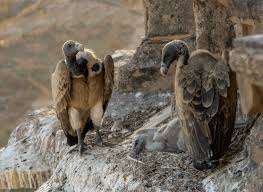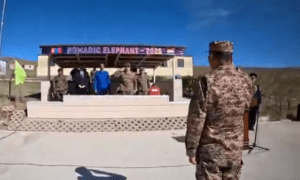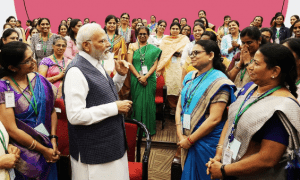The enduring decline of vultures remains one of the poignant stories of wildlife conservation in India. Being able to convert an adult cow carcass to bare bones within a few hours, vultures are extremely efficient scavengers. The collapse in vulture numbers indicates an abundance of available meat and carcasses across the region.
Union Minister Bhupender Yadav visited the Vulture Conservation and Breeding Centre, Pinjore. He assured technical and financial support for the development of the Jatayu Vulture Breeding Centre. “Vultures may be released in the wild after breeding,” said the Minister.
The Proposals
It is proposed to release Oriental white-backed Vultures during the year 2023-24 in the wild. The released birds will be monitored closely for at least a year with satellite transmitters and will look for any behaviour problems to make sure that they adjust well to the wild conditions and that there is no mortality due to diclofenac poisoning. Thereafter the birds would be released regularly in the wild every year.
Into the Jatayu Conservation Breeding Centre
The Jatayu Conservation Breeding Centre (JCBC), was established to investigate the dramatic declines in the population of three India’s Gyps species of vultures, the Oriental white-backed, Long-billed and Slender-billed vultures, from looming extinction.
It is a collaborative initiative between the Haryana Forest Department and the Bombay Natural History Society. The main objectives of the centre were to establish a founder population of 25 pairs of each of the 3 species of vultures and to produce a population of at least 200 birds, in 15 years of each species to be reintroduced to the wild.
”The centre has continued its efforts to make the environment safe for vultures in the wild by monitoring the prevalence of vulture toxic drugs especially diclofenac in veterinary use by carrying out cattle carcass samplings across the country,” said Pankaj Goyal, Principal Chief Conservator, Forest Wildlife. He also said that the different species of exotic birds and animals are being brought into state of Haryana from other states at Pipli, Rohtak and Bhiwani zoos for the promotion and development of Wildlife Tourism and to generate awareness among students for wildlife and the environment.
Conservation Measures
Among the steps taken, there are major ex-situ conservation measures underway at several centres in India to breed populations of the three species in the wild. These sites are in Assam, Gujarat, Haryana, Madhya Pradesh, and West Bengal. The majority of these are managed by dedicated teams together with the respective state forest departments.
The use of pesticides, herbicides and other persistent organic chemicals was put forward as a potential cause for the loss of vultures across Asia, as the use of pesticides (like DDT) is a known problem for birds of prey. In 2006, the Indian government banned the formulation, manufacture, and import of this veterinary diclofenac as a major step to save vultures.




























 WhatsApp us
WhatsApp us